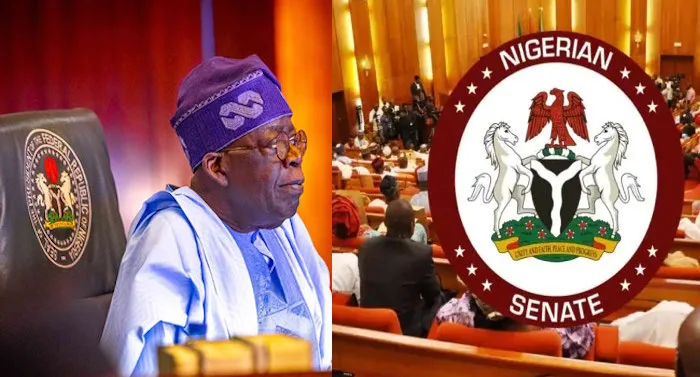Loan to Address Budget Deficit Sparks Debate
The Nigerian Senate has approved President Bola Tinubu’s request for a $2.2 billion loan, intended to partially fund the ₦9.7 trillion budget deficit for the 2024 fiscal year.
This decision, made during Thursday’s plenary, has raised questions about the country’s growing debt profile and its long-term economic implications.
Join our WhatsApp ChannelDeputy Senate President Jibrin Barau, who presided over the session, described the approval process as “transparent and in the best interest of the nation.”
Details of the Loan Request
The $2.2 billion loan, equivalent to ₦1.77 trillion, is part of the administration’s external borrowing plan outlined in the 2024 fiscal strategy. President Tinubu emphasised the loan’s importance in a letter presented to the National Assembly earlier in the week.
“The Presidential request for $2.2 billion is integral to achieving our fiscal objectives for the coming year,” Senate President Godswill Akpabio read from the letter during Tuesday’s plenary.
Akpabio directed the Senate Committee on Local and Foreign Debts to review the proposal and submit a report within 24 hours. Although the deadline elapsed on Wednesday, the committee, chaired by Senator Aliyu Wamakko, presented its findings on Thursday.
Why the Loan is Controversial
Critics argue that Nigeria’s rising debt profile poses risks to the nation’s financial stability. Opposition senators questioned the necessity of taking on additional debt amidst concerns about poor revenue generation and rising inflation.
“While the need to address the budget deficit is clear, we must ask ourselves whether borrowing is the sustainable way forward,” Senator Philip Aduda stated during the debate.
However, supporters of the loan approval, including the Senate leadership, argued that it was a necessary step to avoid stalling critical government projects.
Government’s Perspective on the Loan
Deputy Senate President Barau commended the committee for its expedited review. “The committee has done a commendable job in scrutinising the details and ensuring transparency,” he said.
President Tinubu’s administration has defended the loan as a crucial component of its strategy to stabilise the economy and deliver on campaign promises.
READ ALSO: Quest For Fresh N1.767tn Foreign Loan May Push Nigeria’s Debt To $45bn
“The 2024 budget is ambitious, and this loan will ensure that we meet our targets,” said a spokesperson for the Ministry of Finance.
What’s Next After Loan Approval?
With the loan approved, the government must now secure favourable terms from international creditors. The Senate urged the executive branch to prioritise transparency in utilising the funds and to provide periodic updates on its impact.
“This loan is not just about numbers; it is about trust,” Senator Adamu Bello commented. “The Nigerian people need to see tangible results.”
While the loan approval marks a significant step in funding the 2024 budget, the conversation around Nigeria’s debt sustainability is far from over.
Emmanuel Ochayi is a journalist. He is a graduate of the University of Lagos, School of first choice and the nations pride. Emmanuel is keen on exploring writing angles in different areas, including Business, climate change, politics, Education, and others.



















Follow Us